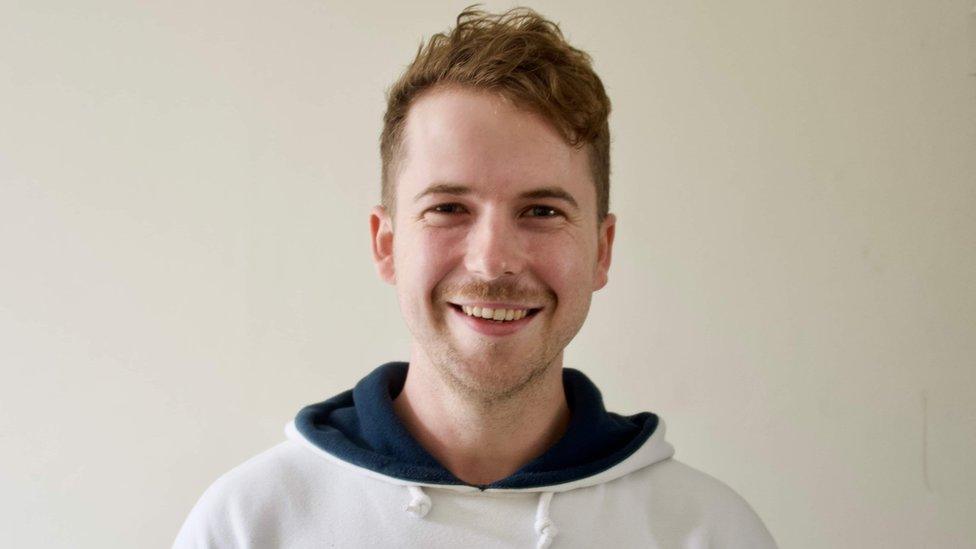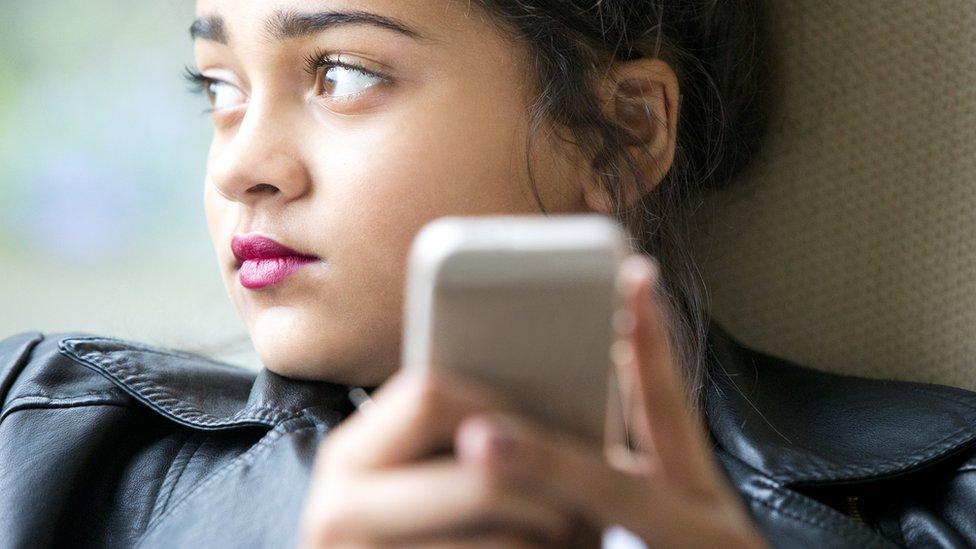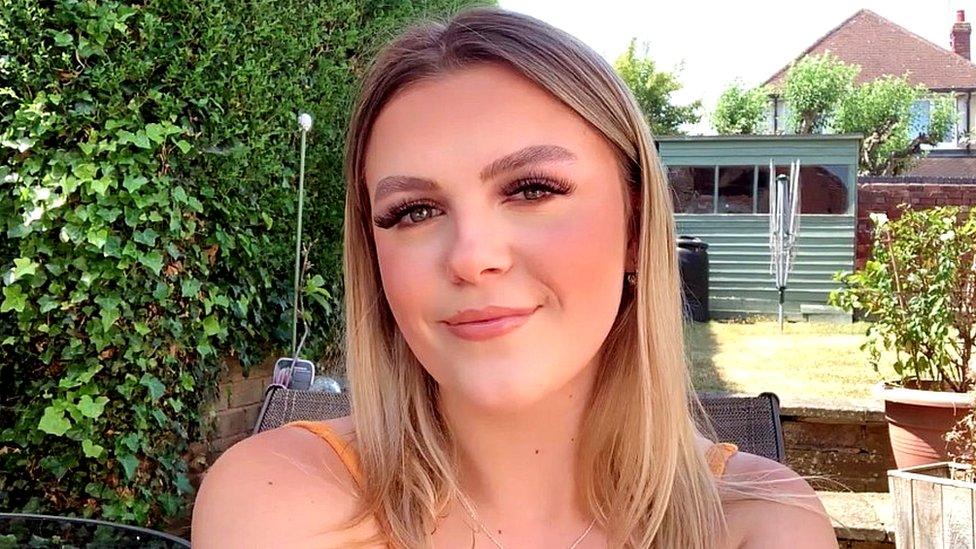TikTok-addicted students delete app during exams
- Published

Eleanor says her TikTok page contained a lot of content which made her feel pressure to look a certain way
Some students decided to delete TikTok during their exam period after becoming addicted and spending too much time on the popular social video app.
A psychologist said the personalised algorithm on TikTok may be leading young people to get addicted.
Dr Nia Williams, of Bangor University, said TikTok becomes addictive because it releases dopamine into the brain, making you feel good.
TikTok has been asked to comment.
Eleanor Crabbe, 22, deleted TikTok in May after realising she was spending too much time on the app instead of revising for her exams at Cardiff University.
She said: "I delete and reinstall TikTok periodically because I noticed I spend too much time on it and get very addicted.
"When I redownload it, I try and get the algorithm to just show me funny stuff, but I always end up getting fitness and fashion content, which I enjoy but I'm aware when I'm watching it that I want to be more like those people."

Eleanor said she was struggling to concentrate during her Masters exams at Cardiff University
She added: "I love TikTok, it has some of the funniest things on there, but there's also a lot of content which makes me feel pressure to look a certain way or buy certain things.
"I'm not someone who struggles with diet and fitness usually, but when that's all I see it can be a bit like 'I need to eat better and exercise more'."
Ed Barnes, 24, also said he deleted TikTok to focus on his exams and dissertation, but that he had not yet felt the urge to return.

Ed said he deletes TikTok when he's busy in other aspects of his life
"I've always found, out of any social media app, TikTok is the one I've found the most difficult to get away from," the Cardiff University student explained.
"You lose a general sense of time because it's video and every video is so different it's very easy to keep watching.
"You look at your clock and realise half an hour has passed instead of two minutes."
He added: "To be honest, since deleting the app, I haven't had the inclination to go back."
Why is TikTok so addictive?
Dr Williams, a lecturer and researcher who specialises in the mental health of children and adolescents, explained why TikTok was so popular.
"Because TikTok videos are short and sweet, they keep your attention going from one to another," she said.
"The way it becomes addictive - when things make us feel good - is the release of dopamine in the brain and you want more and more.
"TikTok has videos you might find funny, and you want to see them because they make you feel good. That's the main nucleus of all sorts of different addictions."

Dr Williams said adverts also work in a similar way on other social media platforms
In addition to this, Dr Williams said the personalised algorithm on TikTok shows the user videos they are likely to want to watch, or should find interesting.
"Whatever you search for on TikTok, that algorithm will be kept. The more you search for things that you like, they will be aware of what you like and that's what you will be fed.
"It's a multimillion pound industry and they will be making money from adverts that will feed into different algorithms."
Dr Williams said adverts worked in a similar way on other social media platforms, such as Facebook, which can track your searches online and show you targeted adverts.
"It will instantly start picking up on your search data, and the more you use it the more sophisticated it becomes," she said.
"It's very clever and it can be useful, however it can also be very destructive as it can lead to addiction to social media."
Dr Williams also spoke of the impact of social media on mental health.
"Lots of studies have been done on Instagram and how it has a negative impact on young girls' self esteem because they want to look like a particular person or live in this filtered online world," she explained.
"Filtered obviously isn't what we see in the mirror, so that can obviously have a negative impact on people."
Yehya records himself revising so his TikTok followers can study with him

Q&A with psychologist Dr Nia Williams
How do I know if I'm addicted to TikTok?
"If it stops you from doing your daily tasks. If there's a need or urge to go back, that's when you need to ask yourself, 'how long am I spending on this app?'
"Is it stopping you from studying, or doing your work?"
What should I do?
"Try to put your phone away, start with an hour a day and try and build on that.
"Delete the app, even if it's just for a week or two, or even a month. Have a break and be mindful of the time that you're spending.
"Be in control of your phone, don't let your phone control you"

Catherine Keenan, from Newport, has 2.3 million followers on TikTok and does not think students need to delete the app altogether, but should allow an hour of screen time a day.
She said: "TikTok can be beneficial in many ways and there's even useful tips on there on how to handle exams and stress.
"As much as exams are important, I think mental health is too and I know a lot of my followers have thanked me for my content when they've been having a bad day or feeling stressed."

Catherine Keenan, 31, makes TikToks with her partner Shaun and their two children, who are five and nine
She added: "TikTok can make you successful too, so if you think social media is for you it's a great stepping stone to show off your talent."

HAYLEY PEARCE PODCAST: Tackling the issues that make the group chats go off
SAM SMITH PRESENTS STORIES OF HIV: From Terrence Higgins to today

- Published28 August 2022

- Published4 May 2022

- Published31 August 2022

- Published27 January 2021

- Published19 July 2022
